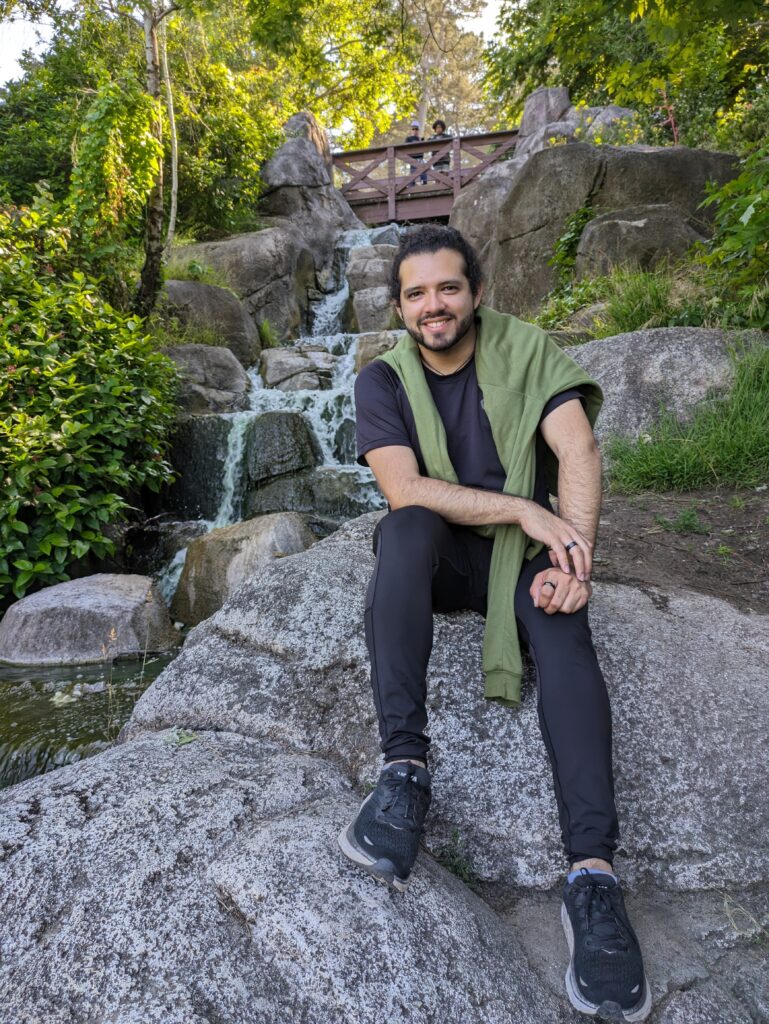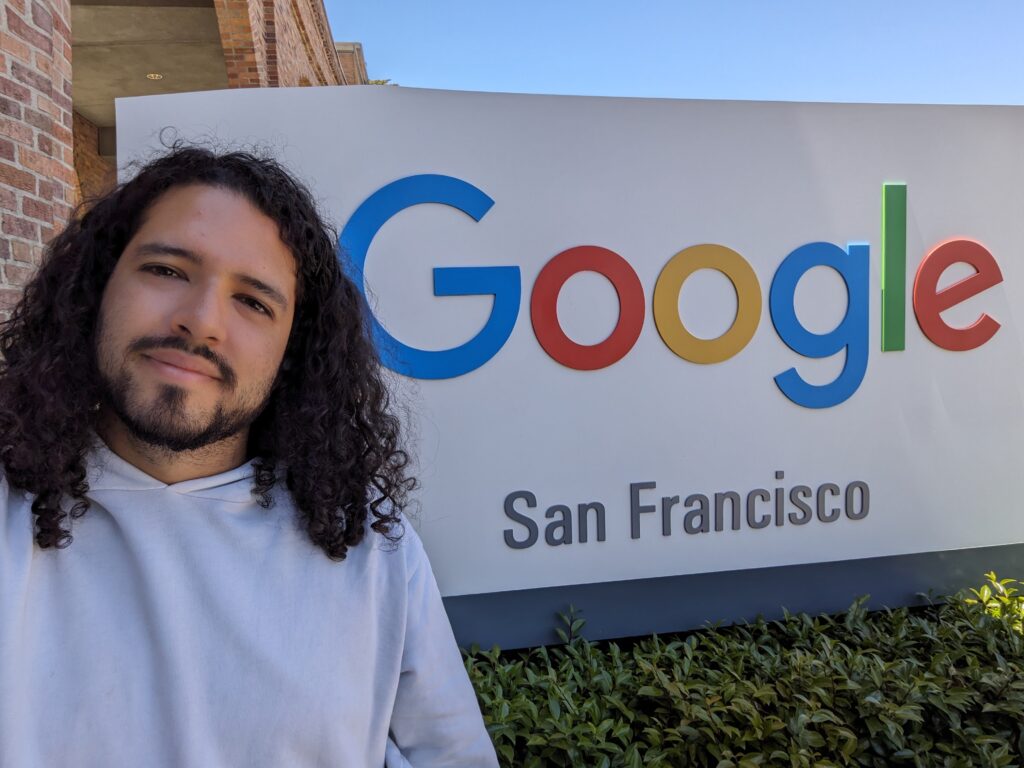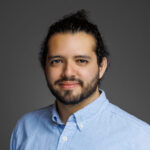
Daniel González is a first-generation college student who moved from Colombia to study in the United States. After becoming one of the first people in his family to earn a bachelor’s degree, he found his passion at the intersection of climate technology, business, and sustainability. Now, Daniel is a master’s student at the Yale School of the Environment and an EDF Climate Corps fellow. He’s also built a following on LinkedIn, where he shares about the barriers first-generation immigrant students face and his journey toward a climate career.
The EDF Climate Corps Fellowship program selects talented and passionate graduate students to provide training and pair them with companies and public institutions determined to meet climate and energy goals. The EDF Climate Corps program matched Daniel with Google, where he spent the summer assisting the corporate giant in reaching necessary sustainability goals to fight against climate change.
We talked to Daniel about navigating barriers to education and how he found his passion at the intersection of climate technology, business, and sustainability. We learned about his motivations for exploring this topic and how he traversed the educational system to become an EDF Climate Corps fellow.
Can you tell us about your background and motivation for studying at a university in the U.S.?
I was born in Bogotá, Colombia, but grew up in Orlando, Florida. So, I spent several years in the United States during my childhood. But then my family moved back to Colombia, where we stayed until I finished high school. When I started applying to universities for undergrad, I thought some things to myself. Where could I make the most impact? Where were the most opportunities? What felt more like home? Questions like that. I applied to universities in the US and Colombia and decided to attend Lafayette College in eastern Pennsylvania, as I received a substantial scholarship. I majored in Engineering and International Affairs and worked for some time before applying to graduate school.
I decided to attend graduate school because I was interested in environmental management, solving climate change, and helping others do that in their own careers. To pursue this, I knew I needed more education as I felt I was reaching a limit in what next steps and roles were available to me. My options were to gain more experience or continue in school to hopefully accelerate climbing the career ladder. Also, as I was ready to move from early career roles into more managing or higher-level roles, I knew getting a master’s would be necessary for such jobs.
When looking at graduate schools, I chose to remain in the US rather than return to Colombia. Both countries have excellent universities, but I ultimately decided to study at Yale School of Environment, where I’ve worked with top professors who are experts in their fields. I could tell from the classes I was taking and conversations with my cohort that I was at an incredible institution. This environment was necessary for me to build my skills, collaborate on innovative ideas, and gain the exposure needed to move my career forward.
What inspired you to pursue a combination of sustainability, climate tech, and business?
After undergrad, I consulted and joined the World Resources Institute, a nonprofit environmental organization. On their data team, I helped create a platform where others could use and leverage data so others could fulfill their goals. We gave access to 300 different environmental data sets that users could manipulate and analyze. This was the very beginning of my interest in climate tech and software.
Afterward, I joined Esri, a geographic information system (GIS) software company that millions of people use worldwide. I was on their software products team and started seeing the impact GIS could have on day-to-day decisions, businesses, and overall lives. This included a focus on, for example, mapping the surface of Mars, responding to COVID-19, and planning sustainable cities. However, my day-to-day work was software in development, not in implementation or deployment. I saw there was a lot of mobilization for climate action in government and individuals, but what about businesses? I think companies have the responsibility and the ability to move faster than individuals and the government. And I do believe that climate change is the biggest challenge that humanity is facing right now. It made sense to combine my background in software, my interest in sustainability, and the realization that businesses can be sustainable and help solve the climate crisis.
I genuinely believe that in the future, every job in one way, shape, or form will be a climate job. With all this in mind, I want to be at the forefront of change that will positively impact the climate.
What led you to apply to the EDF Climate Corps Fellowship? What is your current role in the fellowship?
Initially, I was simply looking for a summer internship, as it was a requirement of the master’s degree program. In short, I had to participate in an experience to prove I was using what I was learning.
Taking a step back, at the beginning of 2023, I had made a resolution for myself that this year, I wanted to challenge and push myself more. I wanted an internship where I didn’t necessarily know all the answers. This was when I applied to the EDF Climate Corps Fellowship. As part of the application, you pick a few organizations you want to work with. You are interviewed by EDF and matched with a host organization to start your internship. Of course, I was interested in sustainability and was very excited to be matched with Google.
Google has extensive climate sustainability commitments. One is net zero, and the other is 24/7 carbon-free electricity, where we want the energy we consume every hour, every day, and every year to come from clean energy sources. I worked on the Climate Operations team and was tasked with accelerating those two goals. In general, we want to expedite the decarbonization of the power grid.
What do you hope to gain from your EDF Climate Corps Fellowship?
Honestly, I’ve learned a lot just from the experience of working at a company like Google, especially coming from a non-traditional background. In my journey, I’ve achieved so much and gained clarity on my career path moving forward. And that’s precisely what you want out of a summer experience! It should help you decide whether you’re going down the right track. As for me, it feels as though tech, software, and climate are still a significant interest of mine, and I hope to continue as a technical program manager post-graduation as well.

As a current EDF Climate Corps fellow, can you offer insights into what made you a successful candidate?
With Climate Corps, I was already the target audience with my background in environmental sustainability. They were looking for applicants who wanted to use business or business-related organizations to create change in the climate space. And because this was already my field of interest, I had a strong inclination that I would be a good fit.
In general, every fellowship is different, and it makes a huge impact right from the start if your application matches what the funding agency is looking for. Fellowships will have all these details in their call for applications, so make sure you really pay attention to what they’re asking for. Take the time to cater your resume, including the language used in the announcement and the jargon of the field you are interested in. Ensure your personal statement addresses all the requirements or questions of the application. It’s easy to miss small details like this, so you must be meticulous when writing. When interviewing, use the language written in the job description.
And finally, what advice do you have for U.S. immigrants, first-generation students, and those interested in pursuing a climate career?
I would give two sets of advice for immigrants, first-gen students, and anyone seeking a career in climate.
People don’t really like to talk about the “bad news,” but I think it’s important to be aware of these things if you’re an immigrant coming to the US. There’s a misconception that, if you come and find a job, that will be enough to stay in the United States, and that’s not the case. There’s still a process of sponsorship, which happens through the H1B visa, a lottery system. It’s a hard pill to swallow, but there really isn’t a lot of logic behind this lottery system, and it’s important to know that so you’re prepared for the steps leading up to this and what to do afterward.
I also wanted to mention how the people around me impacted me. While in undergrad and grad school, I was surrounded by people with much more wealth than my family or I had. Seeing classmates go to expensive restaurants or afford top-of-the-line tech, I had to learn how to navigate situations like that. Because for immigrants like me, it’s more than just affording frivolous purchases but a sense of financial security and independence. And I was in a place where I stressed a lot more about money than some of my peers. I would have to think through ways in which I could get by. It’s a brutal truth but one that makes you grow and is vital to my story as well. I didn’t start with much and had to build myself up to where I am today.
But I’m proud of the challenges I’ve overcome, and that’s important to remember: be proud of who you are, where you came from, and all you’ve achieved. It is the number one thing that keeps me going where I can look back and say, “I’ve gotten my bachelor’s degree in the US, even though almost no one in my family has a bachelor’s degree. I’m doing climate work and focused on trying to, in a sense, save the planet and convince others to do so as well.”
As for the career side, find a way to put yourself out there however you deem fit. For me, I started by documenting my journey on LinkedIn. My presence exponentially grew, and even now, companies sometimes reach out to recruit me. It doesn’t have to be LinkedIn; there are different platforms, but sharing your story has genuine power that gets other people to notice and understand who you are. It’s also a way to connect with the proper organization to help you land jobs or with your visa process. It’s important to share your stories. They are unique and special, and you will find someone interested in hearing about them.
And I want to end with one more piece of advice on job hunting. The first time I was job hunting straight out of undergrad, I applied to hundreds of jobs. I wasn’t getting responses from many of them, and very few interviews. I was very frustrated with the process, which is why I started writing on LinkedIn in the first place. But I learned it’s much wiser to spend your efforts and apply to 10 that are directly related to what you’re interested in, and if you got the position, you would be 100% happy and committed to that role. For my summer internship, this is the approach I took. It was scary not applying to hundreds, but it ultimately paid off. I kept my search very focused and spent time in self-reflection to find out what I wanted, which is essential when searching for a job or internship.
Interested in applying to this fellowship? Bookmark the EDF Climate Corps Fellowship to your ProFellow account. You may also be interested to read our interview with EDF Climate Corps fellow Scott Miller.

© 2023 ProFellow, LLC, all rights reserved.